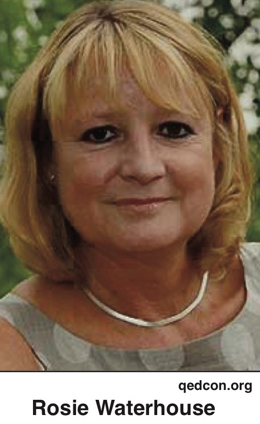Rascals case in brief
In the beginning, in 1989, more than 90 children at the Little Rascals Day Care Center in Edenton, North Carolina, accused a total of 20 adults with 429 instances of sexual abuse over a three-year period. It may have all begun with one parent’s complaint about punishment given her child.
Among the alleged perpetrators: the sheriff and mayor. But prosecutors would charge only Robin Byrum, Darlene Harris, Elizabeth “Betsy” Kelly, Robert “Bob” Kelly, Willard Scott Privott, Shelley Stone and Dawn Wilson – the Edenton 7.
Along with sodomy and beatings, allegations included a baby killed with a handgun, a child being hung upside down from a tree and being set on fire and countless other fantastic incidents involving spaceships, hot air balloons, pirate ships and trained sharks.
By the time prosecutors dropped the last charges in 1997, Little Rascals had become North Carolina’s longest and most costly criminal trial. Prosecutors kept defendants jailed in hopes at least one would turn against their supposed co-conspirators. Remarkably, none did. Another shameful record: Five defendants had to wait longer to face their accusers in court than anyone else in North Carolina history.
Between 1991 and 1997, Ofra Bikel produced three extraordinary episodes on the Little Rascals case for the PBS series “Frontline.” Although “Innocence Lost” did not deter prosecutors, it exposed their tactics and fostered nationwide skepticism and dismay.
With each passing year, the absurdity of the Little Rascals charges has become more obvious. But no admission of error has ever come from prosecutors, police, interviewers or parents. This site is devoted to the issues raised by this case.
On Facebook
Click for earlier Facebook posts archived on this site
Click to go to
Today’s random selection from the Little Rascals Day Care archives….
Click for earlier Facebook posts archived on this site
Click to go to
Today’s random selection from the Little Rascals Day Care archives….
Faulty ‘mental tuning forks’ betrayed therapists
Aug. 23, 2013
“Developing a mental tuning fork for the credibility of a claim, gaining an instinct for when to trust and when to doubt a source – these are two critical components of becoming a confident and effective researcher.”
– From “The Devil in the Details: Media Representation of ‘Ritual Abuse’ and Evaluation of Sources” by Barbara Fister in Studies in Media & Information Literacy Education (May 2003
Although Fister’s observation addresses the challenge of fact-finding on the Internet, it applies just as well to the interviewing of child witnesses. The poorly prepared Little Rascals prosecution therapists – and social services investigators – surely had an overabundance of confidence in their “mental tuning forks” and their “instinct for when to trust and when to doubt.” By contrast, social scientists such as Ceci and Bruck proceed with caution, not credulity.
Prosecutors’ dream: Day-care den of evil-doers
Nov. 28, 2012
“There is nothing that makes us feel so good as the idea that someone else is an evil-doer.”
– Robert Lynd, Irish essayist (1879-1949)
The average Edentonian may have been too fearful and confused to feel good about demonizing the Edenton Seven – ah, but what a rush it must have given the cocksure therapists and prosecutors!
View from UK: ‘Whole culture … has become hysterical’
 Jan. 3, 2015
Jan. 3, 2015
“Lurid tales of children being sexually abused, of animals being ritually slaughtered and babies being bred for sacrifice, in bizarre black magic ceremonies by cults of devil-worshipping Satanists first surfaced in America in the early 1980s. The allegations of what became known as Satanic ritual abuse soon spread to Britain, Australia and New Zealand in the late 1980s and early 1990s….
“As early as 1994 a UK government-funded investigation concluded there was no evidence Satanic ritual abuse existed. Yet despite the continuing absence of evidence, anywhere in the world, a minority of child care professionals including police officers and social workers, and adult psychotherapists, psychologists and psychiatrists persist in the belief that Satanic ritual abuse exists….”
– From a synopsis of remarks by Rosie Waterhouse, a journalist and academic who has been the foremost investigator of supposed “satanic ritual abuse” in Great Britain for the past 24 years
If my Google News feed is any measure, however anecdotal, such British claims may now outnumber those from the States. I asked Dr. Waterhouse to expound:
“There is a hard core of ‘believers’ who continue to spread the myth and very alarmingly seem to have influence among authorities and the media….
“The whole culture now about allegations of child sex abuse – from Satanic to dozens of police and official investigations and inquiries into non-Satanic ‘historic’ allegations, including against high-profile people including celebs and politicians – has become hysterical….
“Setting aside the Satanic abuse allegations – which I believe to be the most spurious, because as far as I am aware there has never been produced any physical, forensic, corroborating evidence, anywhere in the world – the historic non-Satanic allegations which have gone to trial have resulted in some convictions and some acquittals. Of other allegations which have not yet come to court, some may be true. Others I sense are the product of trawls for alleged survivors and witnesses to come forward, often with the prospect of compensation, and are false….
“The tidal wave of allegations is overwhelming. I really am depressed by it all.”
In search of justified public panics….

3BLMedia.com
Kevin Drum
March 28, 2016
“I was thinking about recent public panics and started listing a few of them in my mind. This is just off the top of my head:
- Crack babies
- Super predators
- Lehmann/AIG/Countrywide etc.
- Mad cow
- Deepwater Horizon
- Daycare child molesters
- Ebola
- ISIS/Syrian refugees
“I’m not saying that none of these were justified. Big oil spills are no joke. Ebola was certainly a big deal in Africa. The financial collapse of 2008 wasn’t mere panic.
“And yet, generally speaking it seems as if public panics are either completely unjustified or else wildly overwrought. Am I missing any recent examples where there was a huge panic and it turned out to be wholly justified? HIV would have been justified in the early ’80s, but of course we famously didn’t panic over that — other than to worry about getting AIDS from toilet seats. Help me out here….”
– From “Do We Panic Too Much? (Spoiler: Yes We Do)” by Kevin Drum at Mother Jones (March 24)
![]()











0 CommentsComment on Facebook